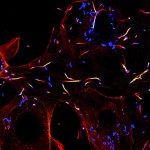Lien vers Pubmed [PMID] – 19201911
J. Immunol. 2009 Feb;182(4):2542-50
Basophils express not only high-affinity IgE receptors, but also low-affinity IgG receptors. Which, among these receptors, are expressed by human basophils is poorly known. Low-affinity IgG receptors comprise CD32 (FcgammaRIIA, FcgammaRIIB, and FcgammaRIIC) and CD16 (FcgammaRIIIA and FcgammaRIIIB). FcgammaRIIA, FcgammaRIIC, and FcgammaRIIIA are activating receptors, FcgammaRIIB are inhibitory receptors, FcgammaRIIIB are GPI-anchored receptors whose function is poorly understood. Basophils were reported to express FcgammaRII, but not FcgammaRIII. We aimed at further identifying basophil IgG receptors. Basophils from normal donors and from patients suffering from an allergic skin disease (atopic dermatitis), allergic respiratory diseases (allergic rhinitis and asthma), or a nonallergic skin disease (chronic urticaria) were examined. We found that normal basophils contain FcgammaRIII transcripts and express FcgammaRIIIB, but not FcgammaRIIIA, which were detected on 24-81% basophils from normal donors and on 12-100% basophils from patients. Noticeably, the proportion of FcgammaRIIIB(+) basophils was significantly lower in atopic dermatitis patients than in other subjects. This decreased FcgammaRIII expression was not correlated with an activated phenotype of basophils in atopic dermatitis patients, although FcgammaRIIIB expression was down-regulated upon basophil activation by anti-IgE. Our results challenge the two dogmas 1) that basophils do not express FcgammaRIII and 2) that FcgammaRIIIB is exclusively expressed by neutrophils. They suggest that a proportion of basophils may be lost during enrichment procedures in which FcgammaRIII(+) cells are discarded by negative sorting using anti-CD16 Abs. They unravel an unexpected complexity of IgG receptors susceptible to modulate basophil activation. They identify a novel systemic alteration in atopic dermatitis.

